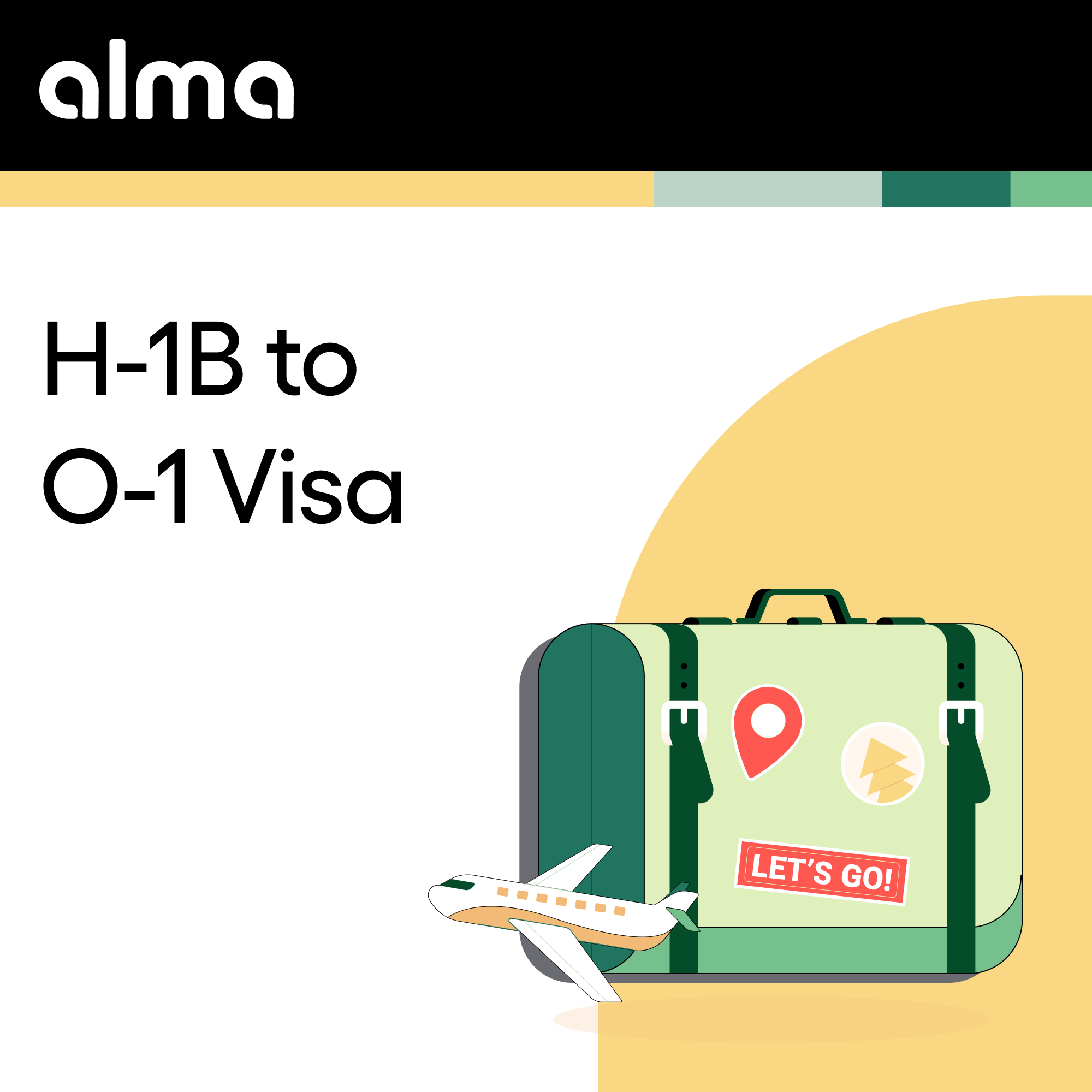- There are several immigration pathways an entrepreneur may qualify for, each with its own unique qualifications, application processes, benefits, and downsides.
- Not every entrepreneur visa leads to a direct pathway to residency or citizenship.
- Figuring out which entrepreneur visa to apply for will depend on your individual needs and goals.
In this comprehensive overview of U.S. entrepreneur visas, we’ll break down the following visa options:
- The O-1A visa is ideal for individuals with extraordinary abilities and proven, exceptional accomplishments in the sciences, athletics, education, or business. For individuals with extraordinary abilities in the arts, motion picture, or television, an O-1B visa may be appropriate.
- The EB-1A is a green card pathway for those who have risen to the very top of their field (in the sciences, arts, education, business, or athletics) through sustained national or international acclaim. The requirements are similar to the O-1 category, but the standard of review is more stringent.
- The E-2 visa is for citizens of countries with an active treaty of commerce and navigation with the United States.
- The EB-1C visa allows international executives and managers to easily transfer to the same-level role at an affiliated U.S. company.
- The EB-2 NIW (National Interest Waiver) is a green card pathway that lets you bypass a job offer or labor certification requirement if you hold an advanced degree (or bachelor’s + 5 years progressively responsible post-baccalaureate experience), or if you’re an individual with exceptional ability in your field of endeavor, whose pursuits will significantly benefit the United States.
- The EB-5 green card pathway is considered a program for foreign investors who make a high minimum investment in a new commercial enterprise that will create at least 10 new full-time jobs for U.S. workers.
- The L-1 visa is structured into two categories: the L-1A, for transferring managers and executives to the U.S., and the L-1B, for transferring specialized knowledge workers.
- The International Entrepreneur Rule (IER) is a little-used option that allows certain startup founders to remain in the U.S. on a temporary "parole" basis for up to five years if they own at least 10% of a recently formed company, play a central role, and can show significant investment or government funding. However, it’s rarely used because it’s parole rather than a visa (providing no long-term stability or clear path to a green card), has strict funding thresholds, and has faced inconsistent enforcement and political uncertainty. Most entrepreneurs instead pursue options like the O-1, H-1B through their own company, or EB-1A/NIW, which offer more stability and clearer routes to permanent residence.
Determining which U.S. visa is best for you will depend on your background, as it must align with the eligibility requirements laid out by the USCIS (U.S. Citizenship and Immigration Services). These requirements, from the qualifications to the necessary documents, will vary depending on the visa type.
Due to the complexity of the process and the amount of information involved, it can be challenging to navigate this alone. This is why we recommend getting in touch with an immigration attorney directly. If you’re looking to start your U.S. entrepreneur visa application process, schedule a free consultation with Alma’s legal team today.
From the moment you provide us with all the necessary paperwork for your application, we’ll prepare your complete visa package within two weeks, which surpasses the typical turnaround time of firms that take several weeks or longer.
Comparing USA Entrepreneur Non-immigrant Visas
| Visa Type | Who Qualifies | Benefits | Downsides | Costs | Pathway to Residency or Citizenship? |
|---|---|---|---|---|---|
| O-1A | Someone with extraordinary ability in the sciences, arts, education, business, or athletics, demonstrated by sustained national or international acclaim, and whose achievements have been recognized in the field through extensive documentation |
Flexibility to own and run a business A business can sponsor your U.S. visa Includes an initial stay of up to three years (with annual renewals in one-year increments thereafter based on continued business involvement) You can establish your own U.S. company (ex: an LLC or corporation) to establish an employee- employer relationship No annual lotteries or quotas No minimum education or wage requirement Unlimited extensions Can work for multiple employers |
Employer-specific, meaning a U.S. employer or U.S. agent (or foreign employer through a US agent) must file the petition No immediate work authorization for spouses The application process is often perceived as complex and extensive (can require a lot of documentation) High standards are required for qualifying |
Can involve several key costs: the USCIS filing fee ($530-$1,055), asylum fee ($300-$600), legal fee (varies significantly), with an optional premium processing fee ($2,805) for expedited service | Yes, can transition to an EB-1 green card |
| E-2 | Must be a national of a treaty country (a country with an active treaty of commerce and navigation with the U.S.) |
Allows treaty investors to invest and operate in a range of E-2 businesses (no minimum investment needed) Allows you to bring spouses and unmarried children (under 21) with you to live in the U.S. Compared to other U.S. visas, the processing time for the E-2 visa is faster You can renew your E-2 visa indefinitely |
Will not directly lead to a green card Involves a strict dependency on the viability of the investment business You must be from a qualifying treaty country with the U.S. |
Successful E-2 visa applicants have invested between $100,000- $200,000 Fees often include Form I-129 ($510), Form I-907 if you would like to expedite the processing ($2,805), Form I-539 if you have dependents ($370) |
The E-2 visa is a temporary, non-immigrant visa, but you can still pursue permanent residency through other paths |
| L-1 | You must have worked abroad for a company with a qualifying relationship with a U.S. company (parent, branch, subsidiary, affiliate) for at least one continuous year in the past three years You must transfer to the US into a managerial or executive role with the same employer (L-1A) You must be an employee who possesses advanced or specialized knowledge or expertise in a company’s products, services, research, or process (L-1B) |
Dual intent allowed (you can pursue permanent residency) Spouses can work within the US without restrictions Quick processing times compared to other visas No annual cap or lottery system |
You must only work for the employer sponsoring you Strict limitations on maximum stay (7 years) If you lose your job, you’ll immediately lose your legal status High denial rates from USCIS |
Costs can include Form I-129 ($1,385), premium processing ($2,805), anti-fraud fee ($500), public law 114-115 fee [if the company has more than 50 employees] ($4,500), DS-160 ($205) |
Yes |
| International Entrepreneur Rule | You must be a foreign entrepreneur with a significant ownership stake (at least 10%) in a U.S. startup formed in the U.S. within the past 5 years Your stay and business venture must provide a significant public benefit |
Your spouse can apply for work authorization It allows up to three entrepreneurs per startup to stay in the U.S. up to 2.5 years initially Fact-based eligibility criteria Congressional approval is not required |
No direct path to permanent residency Parole is granted 2.5 years at a time for a maximum of five years (no extension beyond this point) You can’t change your immigration status while you remain in the U.S. You can only work for your startup |
Costs include Form I-941 ($1,200), a biometrics fee ($85), and external legal fees Without optional services, expect to pay approximately $1,285 |
No |
Comparing US Green Card Pathways
| Pathway Type | Who Qualifies | Benefits | Downsides | Costs | Pathway to residency or citizenship? |
|---|---|---|---|---|---|
| EB-1A | An individual who’s among the small percentage of people who have risen to the very top of their field of endeavor, has sustained national or international acclaim, and is coming to the U.S. to continue work in that field, substantially benefiting the U.S. |
Doesn’t require a job offer or labor certification You can self-petition Expedited processing options are available Family members can accompany the applicant |
Involves extremely high standards (national or international acclaim) Requests for Evidence (RFEs) can amount to a complex and lengthy process Subject to annual numerical and per-country caps |
Generally includes USCIS filing fees: the I-140 petition ($700-$715), the I-485 application (an additional $1,140), the DS-260 application ($325), and a USCIS immigrant fee ($220) | Yes, can transition into a green card |
| EB-1C | You must have worked for a qualifying foreign company for at least one year as an executive or manager. The foreign company must have a qualifying relationship with a U.S. employer (parent, affiliate, subsidiary) You must have a job offer in a managerial or executive role with a U.S. employer who has been active for at least one year before your visa application |
No labor certification required Your spouse can be eligible for work authorization as well You’ll be free to travel in and out of the U.S. You and your family can obtain a green card |
The EB-1C visa has strict requirements (regarding the executive or managerial role) and the qualifying relationship between the foreign and U.S. companies It’s often associated with longer processing times as there are no premium processing options available |
Costs often include USCIS filing fees for Form I-140 ($700-$715), Form I-485 ($1,140-$1,440), Form I-131 ($575), Form I-765 ($410) For consular processing, the DS-260 ($230) |
Yes |
| EB-5 | You must be a foreign investor starting a new business or commercial enterprise that will create jobs in the US — at least 10 full-time jobs for U.S. workers |
Allows you to work anywhere in the U.S. without any restrictions Offers a quick path to permanent residency and citizenship Your family can immigrate with you Includes education, travel, and healthcare benefits |
Requires a high investment amount If your business fails, you risk losing your investment Involves a complex application process and long processing times Possibility of visa rejection if your business doesn’t create enough jobs or if it financially struggles For the first two years, you’ll have conditional permanent residency; to remove these conditions, an additional filing is required |
Costs include a minimum investment of $800,000 for Targeted Employment Areas (TEAs) or $1,050,000 for non-TEA ventures Form I-526E ($11,160) Total cost (without investment) can range from $21,130 to $22,225 |
Yes |
| EB-2 NIW | A specialized immigration option under the EB-2 visa You must meet specific criteria: you’re an advanced degree holder, demonstrate exceptional ability, and your proposed endeavor must benefit the U.S. in some way (you must have substantial merit and national importance) You must prove that you’re in a well-enough position to pursue your endeavor |
No need for an employer to sponsor you; you can sponsor yourself A wide range of fields and talents is applicable No need for a labor certification (for certain occupations) You can pursue a range of employment opportunities or entrepreneurial ventures; you’re not tied to a single employer |
Involves a subjective approval process Demonstrating that your work will benefit the U.S. on a national scale will be difficult Associated with significant visa backlogs from countries including India and China |
Filing fees can include Form I-140 ($715), Form I-485 ($1,440), DS-260 ($325), and a premium processing fee of $2,805 | Yes, direct pathway to permanent residency (green card) |
O-1A

The O-1A visa is often used by startup founders with exceptional accomplishments in their fields who want to reside temporarily in the U.S. for work. The O-1A visa isn’t considered a dual-intent visa, but it does offer some flexibility for those who wish to pursue a green card in the near future.
Qualifications
You must be someone with "extraordinary ability" in the sciences, arts, education, business, or athletics, demonstrated by sustained national or international acclaim, and whose achievements have been recognized in the field through extensive documentation.
Benefits
- Flexibility to own and run a business
- A business can sponsor your visa
- Includes an initial stay of up to three years (with annual renewals in one-year increments thereafter based on continued business involvement)
- You can establish your own US company (e.g., an LLC or corporation) to establish an employee-employer relationship
- No annual lotteries or quotas
- No minimum education or wage requirement
- Unlimited extensions
- Can work for multiple employers
Downsides
- Employer-specific, meaning a U.S. employer or U.S. agent must file the petition
- No immediate work authorization for spouses
- The application process is often perceived as complex and extensive (can require a lot of documentation)
- High standards are required for qualifying
Documents Required
- A written consultation from someone with expertise in the field (peer group or labor organization)
- Written work contract or proof of job offer (employment agreement and company formation documents)
- Detailed list of planned work and activities
- Recommendation letters from experts in the field (we’ve seen applicants include five to six strong letters of recommendation)
- Supporting statement outlining eligibility under selected criteria with evidence attached
At Alma, we’ve successfully supported several early-stage founders with their O-1A petitions. That’s because we understand how to frame an applicant’s contributions and experience to align well with O-1A criteria.

EB-1A
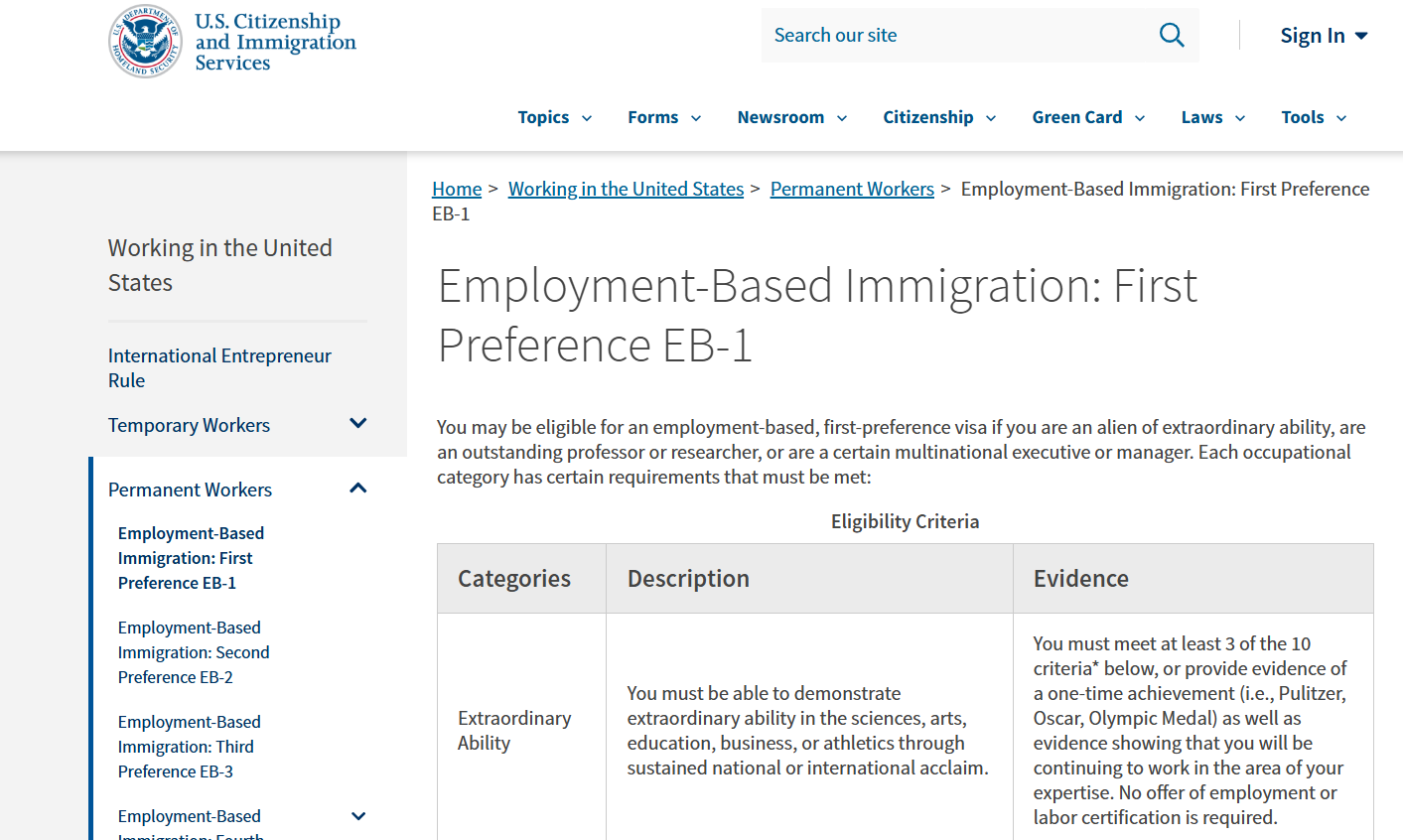
The EB-1A visa is considered an employment-based green card process for professionals who have reached the very top of their fields. The EB-1A visa has some of the most stringent eligibility criteria, so if you successfully qualify, you’ll be able to secure U.S. residency quickly.
Qualifications
You must be someone who’s among the small percentage of people who have risen to the very top of their field of endeavor, with sustained national or international acclaim, and is coming to the U.S. to continue work in that field.
Benefits
- Doesn’t require a job offer or labor certification
- You can self-petition
- Expedited processing options are available
Downsides
- Involves extremely high standards (national or international acclaim)
- Requests for Evidence (RFEs) can amount to a complex and lengthy process
- Subject to annual numerical and per-country caps
Documents Required (3 out of 10 criteria required)
- Award and prizes (nationally or internationally recognized)
- Selective memberships
- Media coverage
- Evidence of judging others’ work
- Original contributions
- Scholarly articles
- Artistic exhibitions
- Leading or critical role in distinguished organizations
- High salary
- Commercial success (in performing arts, if relevant, e.g., box office revenue, record sales)
The EB-1A visa may seem particularly daunting, but applying and securing one isn’t impossible, nor does the process have to be stressful. If you’re a highly qualified professional, our experienced attorneys will be able to identify whether obtaining an EB-1A visa is a viable path for you.
That’s exactly what we were able to do for a cybersecurity expert who, after 15 years in the U.S., was still facing the headache of numerous visa renewals and never-ending green card backlogs.

E-2

The E-2 visa allows entrepreneurs to invest in a U.S. business and operate it. To qualify, you must be a citizen of a country that has an active E2 treaty with the United States.
Qualifications
To be an E-2 treaty investor, you must be a national of a country with an active treaty of commerce and navigation with the U.S.
Benefits
- Allows treaty investors to invest and operate in a range of E-2 businesses with no minimum investment needed
- Allows you to bring spouses and unmarried children (under 21) with you to live in the U.S.
- Compared to other visas, processing times for the E-2 visa is faster
- You can renew your E-2 investor visa indefinitely
Downsides
- Not a dual intent visa — must maintain a permanent residence abroad, and there are travel and visa renewal restrictions that come into play if pursuing a green card process
- Involves a strict dependency on the viability of the investment business
- You must be from a qualifying treaty country with the U.S.
Documents Required
- Cover letter
- Administrative documents
- Company structure and ownership
- Proof of investment
- Proof of the enterprise’s active operations (including business licenses, special permits, utility bills, business transaction records, bank statements, invoices from suppliers, sales contacts, advertising, etc.)
- Proof of substantial investment (including business plan for the next five years)
- Proof that the investment is substantial enough to support the business and generate more than minimal income
- Qualifying documents (resume, company organizational chart, noting who the applicant is replacing, if relevant)
EB-1C

The EB-1C green card process is for intracompany transferees who have worked at a foreign company and whose permanent job opportunity in the U.S. is at an affiliated U.S. company in a managerial or executive role. Unlike the L-1 visa, the EB-1C visa requires the U.S. company involved to be operational for at least one full year before filing the EB-1C visa. The EB-1C visa doesn’t allow you to work as a specialized knowledge worker, but the L-1 visa does.
Qualifications
- You must have worked for a qualifying foreign company for at least one year as an executive or manager. The foreign company must have a qualifying relationship with a U.S. employer (parent, affiliate, subsidiary)
- You must have a job offer in a managerial or executive role with a U.S. employer, who must have been active for at least one year before your visa application
Benefits
- No labor certification required
- Your spouse can be eligible for work authorization as well
- You’ll be free to travel in and out of the U.S.
- You and your dependents can obtain a green card
Downside
The EB-1C visa has strict requirements regarding the executive or managerial role and the qualifying relationship between the foreign and US companies
Documents Required
- Proof of international experience
- Proof of a job offer or ongoing employment
- Documents detailing company structure
EB-2 NIW (National Interest Waiver)
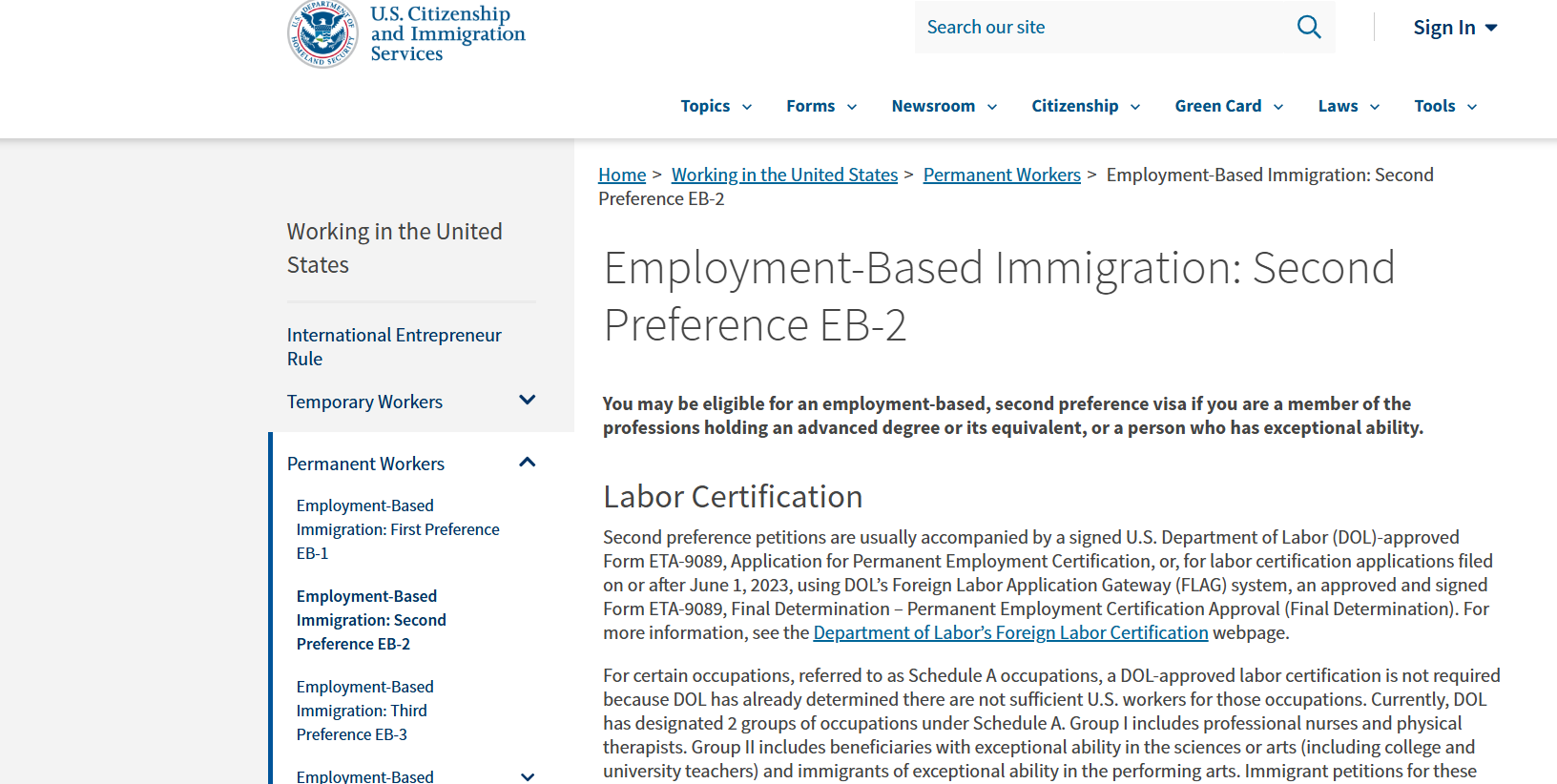
The EB-2 NIW is a specialized green card pathway falling under the Employment-Based Second Preference (EB-2) category. NIW, which stands for National Interest Waiver, means those who qualify can bypass some requirements often associated with employment-based immigration, such as a labor certification or having a confirmed job offer.
Qualifications
- You must meet specific criteria:
- You qualify for the EB-2 category as an advanced degree holder (advanced degree or five years progressively responsible post-baccalaureate experience) or an individual of exceptional ability
- Your proposed endeavor must substantially benefit the U.S. national interest
- You must prove that you’re in a well-enough position to pursue your endeavor
Benefits
- No need for an employer to sponsor you; you can sponsor yourself
- A wide range of fields and talents is applicable
- Visa holders don’t need a labor certification or job offer. You can pursue a range of employment opportunities or entrepreneurial ventures; you’re not tied to a single employer
Downsides
- Demonstrating that your work will benefit the U.S. on a national scale can be challenging
- It’s still associated with significant visa backlogs from countries including India and China
Documents Required
- Advanced degree professional
- Evidence of exceptional ability (you must meet at least three of these criteria):
- Exceptional academic record
- Letters that document 10+ years of work experience
- Professional license or certification
- Evidence of high salary or remuneration
- Membership in professional associations
- Recognition for achievements or significant contributions
- Evidence in support of the national interest waiver

EB-5
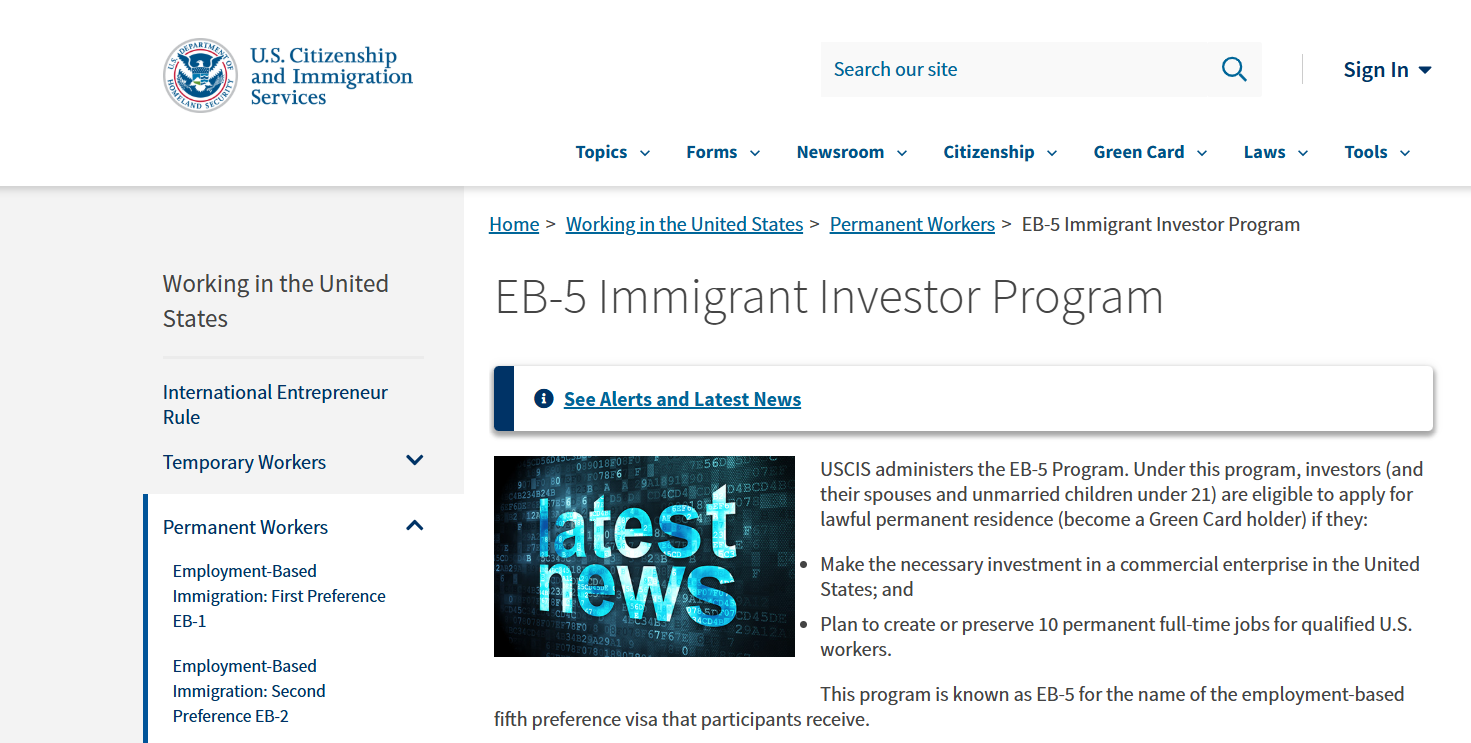
The E-5 visa, unlike the E-2 visa, is an immigrant visa and can lead to a green card. It requires a much higher investment in a U.S. company than the E-2 visa, as the program was specifically created in 1990 to stimulate the U.S. economy with new jobs and capital investment from foreign investors.
Qualifications
You must be a foreign investor starting a new business or commercial enterprise that will create at least 10 full-time jobs for U.S. workers.
Benefits
- Visa holders work anywhere in the U.S. without any restrictions
- Offers a quick path to permanent residency and citizenship
- Your family can immigrate with you
- Includes education, travel, and healthcare benefits
Downsides
- Requires a high investment amount
- If your business fails, you risk losing your investment
- Involves a complex application process and long processing times
- Possibility of visa rejection if your business doesn’t create enough jobs or if it financially struggles
- For the first two years, you’ll have conditional permanent residency; to remove these conditions, an additional filing is required
Documents Required
- Current resume
- Investment documentation (proof of $800,000 to $1,050,000 investment)
- Personal passport (current and expired); all family member passports
- Proof of business and ownership
- Business and professional licenses
- Last five years of tax returns
- Last five years of bank statements
- Financial statements for your business
- Evidence that investment funds were acquired legally
L-1

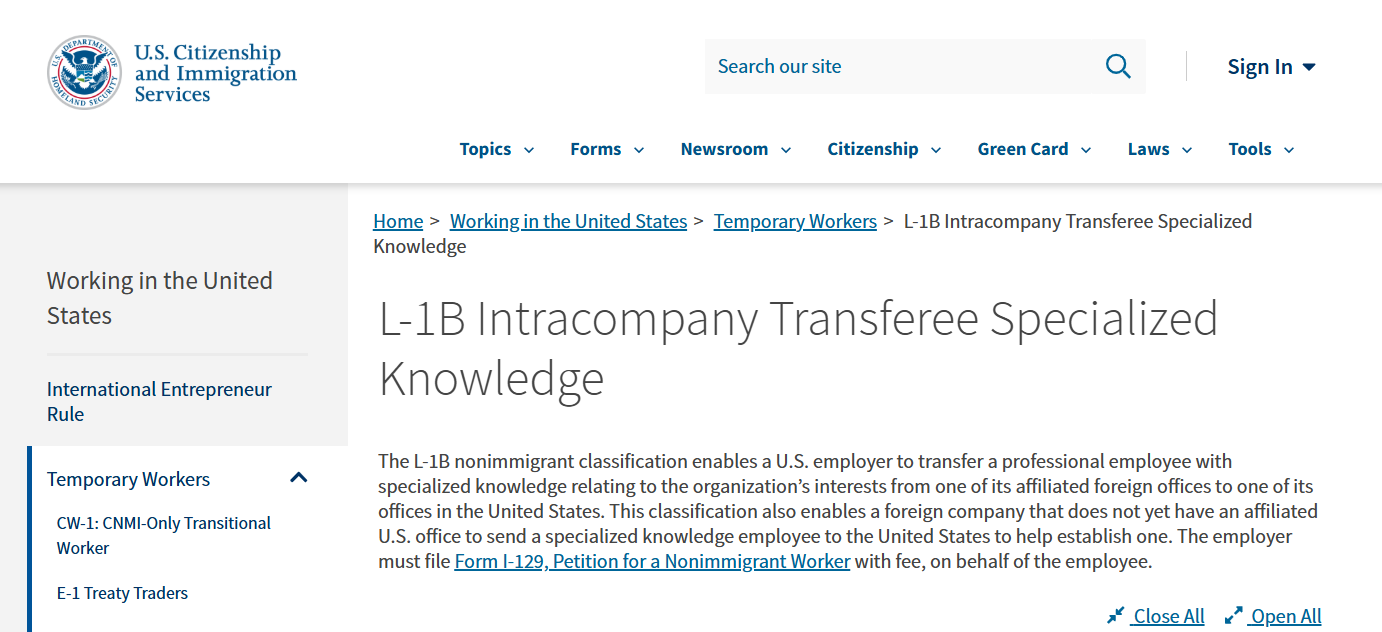
The L-1 visa has two main types: the L-1A visa and the L-1B visa.
- The L-1A visa is for managers and executives transferring to the U.S. for an employer with a qualifying relationship with a U.S. company
- The L-1B visa is for specialized knowledge workers
Qualifications
- You must have worked abroad for a company with a qualifying relationship with a U.S. company (parent, branch, subsidiary, affiliate) for at least one continuous year in the past three years while physically outside of the U.S.
- You must transfer to the U.S. into a managerial or executive role with the same employer (L-1A)
- You must be an employee who possesses advanced or specialized knowledge or expertise in a company’s products, services, research, or process (L-1B)
Benefits
- Dual intent allowed (you can pursue permanent residency)
- Spouses of visa holders can work within the U.S. incident to status without restrictions
- No annual cap or lottery system
Downsides
- You must only work for the employer sponsoring you
- Strict limitations on maximum stay (seven years for L-1A and 5 years for L-1B)
- If you lose your job, you’ll immediately lose your legal status
- High denial rates from U.S. immigration
Documents Required
- Personal passport (current and expired)
- Work experience letters from previous employers
- Bank records from the last six months
- Visa interview appointment letter
- Photographs of the place of employment
- Degree or certificates of training
- Current resume
- Company structure or organizational chart
The International Entrepreneur Rule

The International Entrepreneur Rule refers to a federal regulation that allows entrepreneurs to temporarily stay in the U.S. (for up to five years) with the intention of starting and growing new companies.
Qualifications
- You must be a foreign entrepreneur with a significant ownership stake (at least 10%) in a U.S. startup formed within the past 5 years
- Your stay and business venture must provide a significant public benefit
Benefits
- Your spouse can apply for work authorization
- It allows up to three entrepreneurs per startup to stay in the U.S. up to 2.5 years initially
- Fact-based eligibility criteria
- Congressional approval is not required
Downsides
- No direct path to permanent residency
- Parole (the right to temporarily enter or remain in the U.S.) is granted 2.5 years at a time for a maximum of five years (no extension beyond this point)
- You can’t change your immigration status while you remain in the US
- You can only work for your startup
Documents Required
- Proof of ownership and role
- Documents regarding startup formation and activity
- Evidence of U.S. investment or funding
- Proof of growth potential
- Proof of qualifications
- Personal identification and immigration history
- Supporting documents (including press coverage, evidence of job creation, tax returns, etc.)
How Alma Can Help
We walk clients through the entire visa application process with high-quality and efficient immigration services. Clients are onboarded to our in-house platform, where they can securely upload required documents and communicate directly with our in-house attorneys.
While we prioritize speed, we never compromise on the quality of our immigration law expertise and services, as demonstrated by our 99%+ success and approval rate. When you work with Alma, you can expect a high level of responsiveness that’s otherwise rare in this industry.
You’ll be able to make unlimited calls and emails and receive continuous, personalized support for the entire time you’re a client with Alma.
By providing 1:1 tailored expertise and streamlining the overall process for talent visas and company-sponsored immigration, it’s no surprise that we have a long list of success stories.
Schedule a free immigration consultation to get a clear understanding of our timelines, pricing, and how we can best guide you through the entrepreneur visa process.
Frequently Asked Questions
Regardless of the visa type, you can often expect to file forms with U.S. immigration and provide extensive documentation regarding your background, achievements, business, assets, plans, and more.
If you need help figuring out which entrepreneur visa is best for you, schedule a free consultation with an immigration lawyer today.
While different visa types have different immigration law requirements, you can expect to set aside a substantial amount of money (especially if you opt for premium processing, if it’s available). The EB-5 visa, for example, requires an investment of at least $800,000 for Targeted Employment Areas (TEAs) or $1,050,000 for non-TEA ventures. The E-2 visa, on the other hand, has no minimum investment.
You can look into online directories or contact private law firms to find immigration attorneys near you. At Alma, after a short consultation, clients will work with expert in-house immigration attorneys directly and have unlimited access to the attorney via email and Alma’s in-house platform throughout the entire visa application process.
Our in-house platform lets you securely share and track all the necessary documents, including Service Level Agreements (SLAs), and you’ll receive automatic notifications and updates.



.png)
.png)
